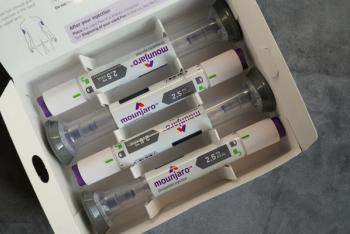
Insurance
Latest News

Latest Videos

More News

According to data from HHS' Office of Minority Health, Asian Americans are 60% less likely to utilize mental health services, even though 16.8% of those in the community experience mental illness.

A new program from Optum Rx would offer greater predictability by using a guarantee-based pricing model.

Patients struggle to afford glucagon-like peptide-1 (GLP-1) medications for diabetes; doctors see potential and pitfalls in new ChatGPT model’s humanlike conversations; Medicare payment reform efforts focus on inflation adjustments and payment model overhauls.

The results of T1International’s 2022 Out-of-Pocket Expenses survey highlight many huge inequities in the US and around the world relating to insulin and diabetes care supplies.

The US Senate hosted a panel addressing physician and health care shortages and efforts to increase minority representation in the medical field. An expert discussed initiatives to prevent senior homelessness. Advocates called for the repeal of the Comstock Act. Regulatory reforms are called for to improve rural cancer patients' access to pharmacies. Research reveals the impact of denials on patient access to immunology treatments.

Concerns arise over primary care shortages; women struggle with coverage for effective nonhormonal treatments; FLiRT variants drive concerns amidst waning surveillance and immunity

Other findings from the latest Kaiser Family Foundation Health Tracking Poll shed light on public awareness, use, and opinions on Medicare coverage of glucagon-like peptide-1 (GLP-1) drugs.

Covering antiobesity medications like semaglutide could save Medicare around $500 million annually; preliminary CDC data showed a 3% decline in the number of US overdose deaths last year; the Biden administration recently announced the first national maternal mental health strategy.

At the spring conference of the New Jersey Health Care Quality Institute, speakers discussed how health policy, affordability, and transparency may play a role in voters’ decisions.

The senate hearing held by the US Senate Committee on Health, Education, Labor, and Pensions, led by Sen. Bernie Sanders (I, Vermont), chairman of the committee, and ranking member Sen. Bill Cassidy, MD, (R, Louisiana), addressed the critical issue of physician and health care worker shortages, as well as the maternal health crisis, in the US.

On this episode of Managed Care Cast, experts from Illinois CancerCare discuss CMS regulations limiting the access of rural patients with cancer to medically integrated pharmacies.

A new study highlights significant disparity in reimbursement rates across states between hospitals and Medicare; the first patient to receive a genetically modified pig kidney has died; research examines outcomes of over 500 patients receiving medication abortion pills by mail.

The CEO of SCAN Health Plan discusses its first-ever Environmental, Social, and Governance Report.

This week's topics include frameworks for improving health equity nationwide, addressing social determinants of health, discussing CMS's Medicare rules, investigating breast cancer treatment refusal, and exploring HIV and major depressive disorder in underrepresented groups.

Results featured at the Academy of Managed Care Pharmacy 2024 annual meeting revealed a pattern of prior authorization rejections that could delay necessary therapeutic treatments for various patient groups.

Gaps in the delivery and coverage of behavioral health care can be addressed through continued advocacy for better policies and financial incentives surrounding treatment.

Ascension Health was hit with a cyberattack; a new federal policy is aimed at integrating Medicare and Medicaid coverage; the CDC is planning to post data on influenza A found in wastewater in a public dashboard.

On this episode of Managed Care Cast, we're talking with Karen Iapoce, senior director of government products and programs at ZeOmega, about the recent CMS final rule on Medicare Part D and Medicare Advantage.

Fifty percent of US rural hospitals are facing financial problems; US lawmakers have called out the corporate spending of 3 large nursing home companies; hospice patients under Medicare Advantage are now facing uncertainty after the government ended its pilot program.

Rising Medicare Advantage enrollment occurred alongside declines in enrollment in traditional Medicare with employer-sponsored supplemental coverage and traditional Medicare without supplemental coverage.

Neil Goldfarb, president and chief executive officer of the Greater Philadelphia Business Coalition on Health (GPBCH), shared insight into the themes and sessions at the upcoming GPBCH Annual Conference taking place June 6, 2024.

With more therapies available in bladder, kidney, and prostate cancers, collaboration among health care providers can help ensure patients are getting the most appropriate care for their type and stage of cancer, said Mary Dunn, MSN, NP-C, OCN, RN, of University of North Carolina.

Inma Hernandez, PharmD, PhD, professor at the University of California, San Diego Skaggs School of Pharmacy and Pharmaceutical Sciences, discussed the potential sources of savings associated with the Medicare Drug Price Negotiation Program.

The Senate Finance Committee has introduced bipartisan legislation that proposes using Medicaid and Medicare programs to help prevent and reduce generic drug shortages; US indicators for COVID-19, flu, and respiratory syncytial virus (RSV) declined further last week; findings from a recent study reveal growing disparities in child death rates across racial and ethnic groups.

This week, the Center on Health Equity and Access highlights a variety of gaps that exist in health care, spanning women's health, the rising rate of metabolic disease, and policy for LGBTQ+ and immigrant populations. The consensus among featured experts points to comprehensive care models.












